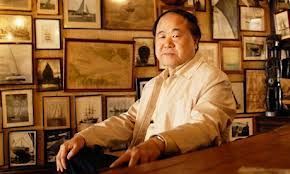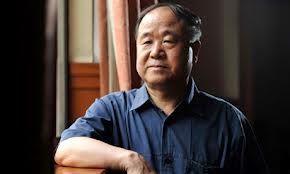Nobel Prize for Literature in 2012, deserved prize or gift to calm the game with Beijing ?
 Like every time a Chinese won a Nobel Prize, a controversy triggered. We have experienced it in 2000 and 2010 respectively with Gao Xingjian and Liu Xiaobo. This year, the appointment is with Mo Yan.
Like every time a Chinese won a Nobel Prize, a controversy triggered. We have experienced it in 2000 and 2010 respectively with Gao Xingjian and Liu Xiaobo. This year, the appointment is with Mo Yan.
If Beijing applauded the decision of the Swedish Academy to award the Nobel Prize for Literature in 2012 to the chinese novelist Mo Yan, this choice has not rained for Chinese dissidents.
The "People's Daily", the official newspaper of the Chinese Communist Party, has immediately hailed his award and sent his "congratulations" to Mo Yan. "He is the first Chinese writer to win the Nobel Prize in Literature", greets a visitor to the site of the official daily newspaper.
But why Beijing is pleased with the decision? Mo Yan, whose nickname he has chosen means "The one who does not speak", is deemed closer to the Chinese government, which does not recognize freedom of expression. A reputation he does not deny. Long time soldier in the People's Liberation Army, Mo Yan respects a regime that allowed him to get out, through the army, his poor and illiterate peasant conditions.
In addition, Mo Yan has also not shown in its support for the Chinese intellectual Liu Xiaobo, who remains in prison for "subversion", and the fight for human rights in his country.
Guan Moye, the real name of Mo Yan, is not really the first Chinese Nobel Prize for Literature, in 2000, Beijing had not appreciated the award to Gao Xingjian, a writer born in China, dissident naturalized French. And in 2010, the Nobel Peace Prize was awarded to Liu Xiaobo, a price that was downright provoked the fury of the Chinese regime.
Mo Yan's reputation of pro-regime has been criticized Chinese dissidents. A few hours before the announcement of the prize, the lawyer Teng Biao said that Mo Yan "sings the same song as the non-democratic regime." He even thought it would be "inappropriate" to award him the Nobel.
And if Mo Yan called. just after the announcement of the Nobel Prize for Literature in 2012, for the release of Liu Xiaobo, the dissident artist Ai Weiwei has shown the least bitter towards his compatriot, holding that the Nobel Committee had erred in awarding an author who bears "the task of government." "Mo Yan said he had nothing to say about Liu Xiaobo. I think the organizers of the Nobel withdrew from reality this award", he commented.
Even in the Chinese street, the controversy did not stop. The news of his award unleashed Weibo, the Chinese Twitter. In less than two hours, more than three million comments were posted on the social network, as shown in the french newspaper "Le Monde". Feelings are mixed: some welcome this "honor" which also goes to the Chinese language and Chinese people.
Others are bitterer, saying that they were disconnected from the Nobel site wanting to see the page on Liu Xiaobo. Some go even further and suggest giving "the Nobel Prize for Literature" the next time to a writer from North Korea.
 But things may be a bit more complex: Mo Yan "is a free man, free in his mind and in his writing, which deserves international recognition", said Pierre Haski on Rue89. "Some of his books, including Beautiful breasts, beautiful buttocks were censored", he adds.
But things may be a bit more complex: Mo Yan "is a free man, free in his mind and in his writing, which deserves international recognition", said Pierre Haski on Rue89. "Some of his books, including Beautiful breasts, beautiful buttocks were censored", he adds.
For her part, Sabine Delanglade wrote in the editorial of Echos that Mo Yan's rural childhood "in the Great Leap Forward" (stalling the stomach with coal dust) do not make him a friend of the regime."But because of his job in the army (he did not leave until 1997) he could start writing more than 80 novels and short stories, which compensates and makes that dissidents regret the lack of support of one of the most famous Chinese writers in the world", she believes.
For its part, the french magazine "l'Express" sees that Mo Yan has mentioned in his novels sensitive issues in China. "In his recent book Frogs, Mo Yan evokes the politics of birth control in China, however, a subject that has ceased to be taboo a few years ago", writes the magazine. "In Sorghum Clan, he speaks of the Japanese invasion, and he criticized the leaders of the Communist Party in the Country of Alcohol."
For Sean Rose, from France 24, even though Mo Yan does not stand away of power, he wrote and always says what he thinks.
But what Mo Yan himself thinks? "I write in China led by the Communist Party", has defended the writer, adding: "My work since 1980 clearly show that I write from a perspective that is the human being".
He believes that many of his critics have not read his books. "If they had read it, they would have realized that they were written under pressure and they exposed me to great risk", said the Nobel 2012.

/https%3A%2F%2Fprofilepics.canalblog.com%2Fprofilepics%2F4%2F2%2F426736.jpg)


/https%3A%2F%2Fassets.over-blog.com%2Ft%2Fcedistic%2Fcamera.png)
/https%3A%2F%2Fstorage.canalblog.com%2F60%2F39%2F497575%2F88088089_o.jpg)
/https%3A%2F%2Fstorage.canalblog.com%2F92%2F58%2F497575%2F88087216_o.jpg)
/https%3A%2F%2Fstorage.canalblog.com%2F59%2F61%2F497575%2F84555129_o.jpg)